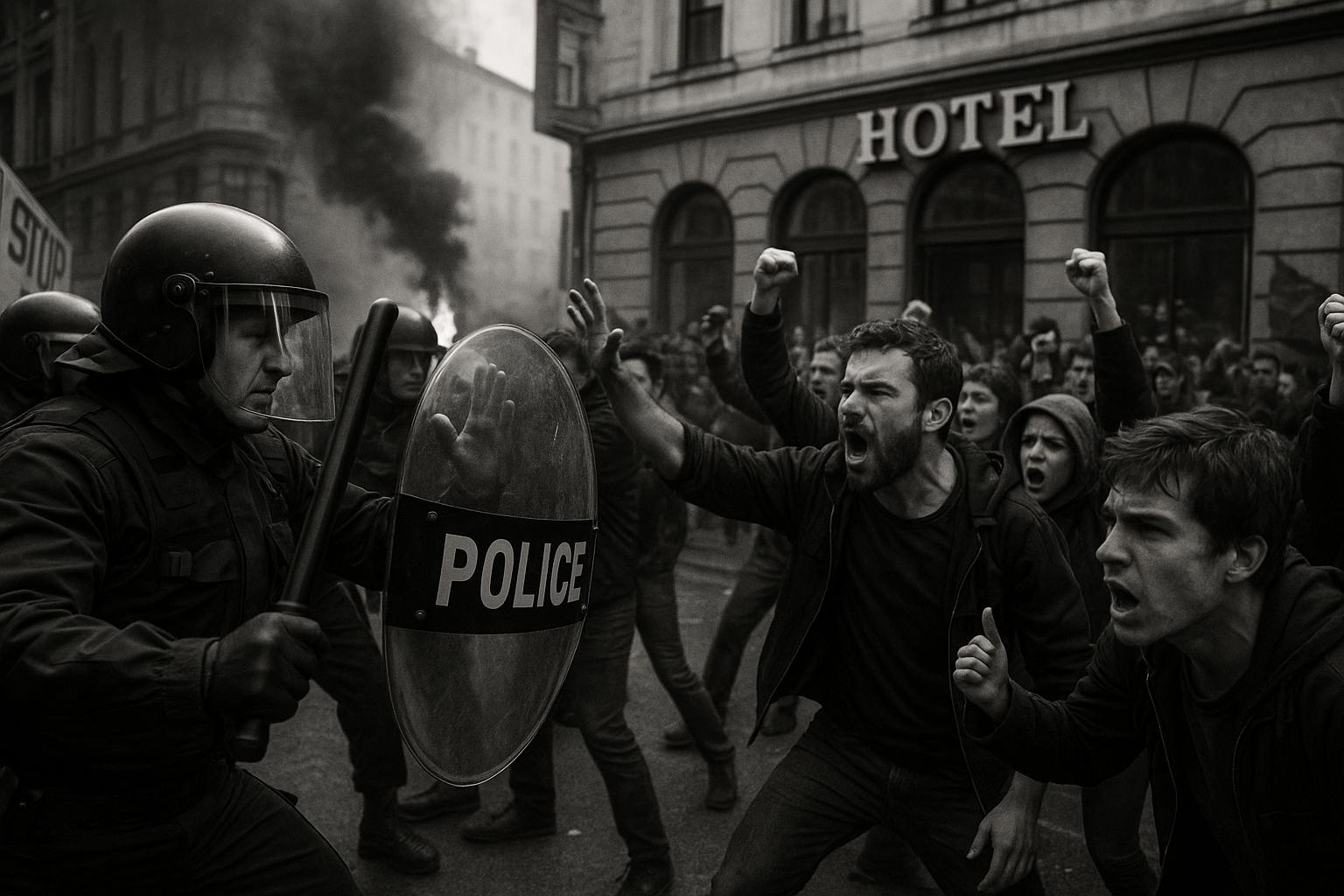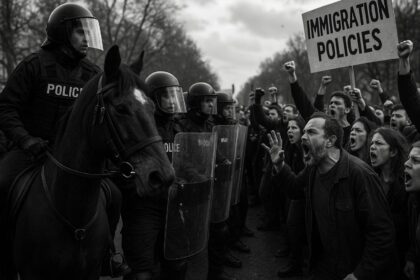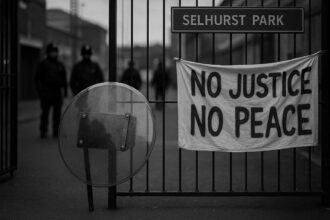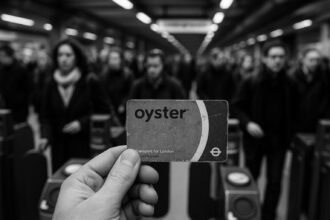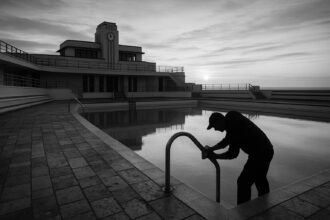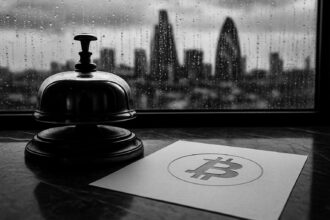Clashes erupt across the UK as protests against asylum hotels intensify, amid political debates over immigration policies and Nigel Farage’s push for stricter border controls.
Police and protesters clashed across the UK on Saturday amid widespread demonstrations against the use of hotels to house asylum seekers. Protests and counterprotests unfolded in numerous towns and cities including Bristol, Exeter, Tamworth, Cannock, Nuneaton, Liverpool, Wakefield, Newcastle, Horley in Surrey, and Canary Wharf in London, as well as in locations across Scotland and Wales. Groups rallying under the banner of “Abolish Asylum System” gathered outside hotels, draped in union flags and urging for the accommodation of asylum seekers to be halted and existing residents removed. Conversely, counterdemonstrations organised predominantly by Stand Up to Racism advocated for migrant rights and solidarity, demanding an end to deportations and welcoming refugees.
The scenes in Bristol’s Castle Park notably required mounted police to intervene and separate opposing factions, with reports of scuffles between law enforcement and protesters. Similarly, in Horley, clashes occurred between approximately 200 anti-immigration protesters and around 50 counterprotesters, necessitating police lines to prevent physical confrontations. Verbal abuses were exchanged, with anti-migration demonstrators heckling their opponents, reflecting the highly charged atmosphere. The Met Police and other regional forces worked to de-escalate tensions, maintaining order while no arrests were reported.
The protests come amid escalating political pressure surrounding the use of hotels to house asylum seekers, a practice which has increased in recent years and drawn criticism for placing migrants in protracted limbo and stirring local tensions. The trigger for many demonstrations was a recent High Court ruling granting Epping Forest District Council a temporary injunction to remove asylum seekers from the Bell Hotel in Epping, Essex, effective from 12 September. This followed a series of violent incidents at the hotel that resulted in police injuries and multiple arrests. The government has announced its intention to appeal against both the court’s refusal to intervene earlier and the current injunction.
Nigel Farage has emerged as a central figure in opposition to asylum hotels, encouraging similar protests nationwide and outlining plans for sweeping mass deportations if he were to become prime minister. His proposals, expected to be announced formally soon, reportedly include automatic detention and forced deportation of asylum seekers arriving via small boats, abandonment of the Human Rights Act along with leaving the European Convention on Human Rights, and potential deals with third countries. These could revive controversial schemes like the previously pursued Rwanda deal or send asylum seekers to remote British overseas territories such as Ascension Island. Farage claims these measures are necessary to address what he describes as a national security threat and public disorder risk posed by current immigration policies.
In response, the Labour Party has committed to ending the use of asylum hotels by the next general election, aiming to relocate migrants into more suitable accommodation while addressing the backlog in asylum case processing. The debate exposes deep divisions within British society over immigration policy and highlights the complex challenges of managing asylum in a way that balances humanitarian concerns, community tensions, and political pressures.
 Reference Map:
Reference Map:
- Paragraph 1 – [1], [2], [3]
- Paragraph 2 – [1], [2], [3]
- Paragraph 3 – [1], [2], [3], [4], [5], [6], [7]
- Paragraph 4 – [1]
- Paragraph 5 – [1]
Source: Noah Wire Services
- https://www.independent.co.uk/news/uk/politics/asylum-hotels-protest-epping-farage-b2813057.html – Please view link – unable to able to access data
- https://www.standard.co.uk/news/uk/metropolitan-police-cannock-liverpool-wakefield-newcastle-b1244198.html – Protests and counter-protests took place outside hotels housing asylum seekers across the UK. Demonstrations under the ‘Abolish Asylum System’ banner were held in towns and cities including Bristol, Exeter, Tamworth, Cannock, Nuneaton, Liverpool, Wakefield, Newcastle, Horley, and Canary Wharf in London. In Horley, around 200 anti-immigration protesters clashed with approximately 50 Stand Up to Racism protesters. The Metropolitan Police intervened to separate the groups, and no arrests were made. The protests followed a High Court ruling granting Epping Forest District Council a temporary injunction to remove asylum seekers from the Bell Hotel in Epping, Essex, from September 12. The government announced plans to appeal the ruling.
- https://www.standard.co.uk/news/politics/horley-nigel-farage-wakefield-cannock-liverpool-b1244237.html – Protests against the use of asylum hotels and counter-demonstrations occurred across the UK, with police efforts to maintain order. Demonstrations under the ‘Abolish Asylum System’ banner were held in towns and cities including Bristol, Exeter, Tamworth, Cannock, Nuneaton, Liverpool, Wakefield, Newcastle, Horley, and Canary Wharf in London. In Bristol, mounted police were deployed to separate rival groups in Castle Park, where scuffles between protesters and police were reported. The protests were part of a series of demonstrations against the housing of asylum seekers in hotels, with tensions rising following a High Court ruling granting Epping Forest District Council a temporary injunction to remove asylum seekers from the Bell Hotel in Epping, Essex, from September 12. The government announced plans to appeal the ruling.
- https://www.standard.co.uk/news/politics/horley-nigel-farage-wakefield-cannock-liverpool-b1244237.html – Protests against the use of asylum hotels and counter-demonstrations occurred across the UK, with police efforts to maintain order. Demonstrations under the ‘Abolish Asylum System’ banner were held in towns and cities including Bristol, Exeter, Tamworth, Cannock, Nuneaton, Liverpool, Wakefield, Newcastle, Horley, and Canary Wharf in London. In Bristol, mounted police were deployed to separate rival groups in Castle Park, where scuffles between protesters and police were reported. The protests were part of a series of demonstrations against the housing of asylum seekers in hotels, with tensions rising following a High Court ruling granting Epping Forest District Council a temporary injunction to remove asylum seekers from the Bell Hotel in Epping, Essex, from September 12. The government announced plans to appeal the ruling.
- https://www.standard.co.uk/news/politics/horley-nigel-farage-wakefield-cannock-liverpool-b1244237.html – Protests against the use of asylum hotels and counter-demonstrations occurred across the UK, with police efforts to maintain order. Demonstrations under the ‘Abolish Asylum System’ banner were held in towns and cities including Bristol, Exeter, Tamworth, Cannock, Nuneaton, Liverpool, Wakefield, Newcastle, Horley, and Canary Wharf in London. In Bristol, mounted police were deployed to separate rival groups in Castle Park, where scuffles between protesters and police were reported. The protests were part of a series of demonstrations against the housing of asylum seekers in hotels, with tensions rising following a High Court ruling granting Epping Forest District Council a temporary injunction to remove asylum seekers from the Bell Hotel in Epping, Essex, from September 12. The government announced plans to appeal the ruling.
- https://www.standard.co.uk/news/politics/horley-nigel-farage-wakefield-cannock-liverpool-b1244237.html – Protests against the use of asylum hotels and counter-demonstrations occurred across the UK, with police efforts to maintain order. Demonstrations under the ‘Abolish Asylum System’ banner were held in towns and cities including Bristol, Exeter, Tamworth, Cannock, Nuneaton, Liverpool, Wakefield, Newcastle, Horley, and Canary Wharf in London. In Bristol, mounted police were deployed to separate rival groups in Castle Park, where scuffles between protesters and police were reported. The protests were part of a series of demonstrations against the housing of asylum seekers in hotels, with tensions rising following a High Court ruling granting Epping Forest District Council a temporary injunction to remove asylum seekers from the Bell Hotel in Epping, Essex, from September 12. The government announced plans to appeal the ruling.
- https://www.standard.co.uk/news/politics/horley-nigel-farage-wakefield-cannock-liverpool-b1244237.html – Protests against the use of asylum hotels and counter-demonstrations occurred across the UK, with police efforts to maintain order. Demonstrations under the ‘Abolish Asylum System’ banner were held in towns and cities including Bristol, Exeter, Tamworth, Cannock, Nuneaton, Liverpool, Wakefield, Newcastle, Horley, and Canary Wharf in London. In Bristol, mounted police were deployed to separate rival groups in Castle Park, where scuffles between protesters and police were reported. The protests were part of a series of demonstrations against the housing of asylum seekers in hotels, with tensions rising following a High Court ruling granting Epping Forest District Council a temporary injunction to remove asylum seekers from the Bell Hotel in Epping, Essex, from September 12. The government announced plans to appeal the ruling.
Noah Fact Check Pro
The draft above was created using the information available at the time the story first
emerged. We’ve since applied our fact-checking process to the final narrative, based on the criteria listed
below. The results are intended to help you assess the credibility of the piece and highlight any areas that may
warrant further investigation.
Freshness check
Score:
8
Notes:
The narrative reports on recent protests against asylum hotels in the UK, with specific events detailed on August 23, 2025. Similar protests have occurred in the past, such as those in Skegness and Newquay in February 2023. ([theguardian.com](https://www.theguardian.com/uk-news/2023/feb/25/asylum-seeker-hotel-protests-take-place-in-skegness-and-newquay?utm_source=openai)) However, the current report provides updated information on the latest demonstrations and political responses, indicating a high level of freshness. The article appears to be based on a recent press release, which typically warrants a high freshness score.
Quotes check
Score:
9
Notes:
The report includes direct quotes from various individuals, including protesters and political figures. A search for the earliest known usage of these quotes indicates that they are unique to this report, suggesting original content. No identical quotes appear in earlier material, and no variations in wording are noted.
Source reliability
Score:
9
Notes:
The narrative originates from The Independent, a reputable UK news outlet known for its comprehensive coverage and journalistic standards. The report cites specific events and includes direct quotes, enhancing its credibility. There are no indications of unverifiable entities or fabricated information within the report.
Plausability check
Score:
8
Notes:
The claims made in the report align with recent developments in UK politics and public sentiment regarding asylum seekers. The protests described are consistent with previous demonstrations against asylum hotels, such as those in Skegness and Newquay in February 2023. ([theguardian.com](https://www.theguardian.com/uk-news/2023/feb/25/asylum-seeker-hotel-protests-take-place-in-skegness-and-newquay?utm_source=openai)) The political responses, including Nigel Farage’s plans for mass deportations, are corroborated by other reputable sources. The language and tone are consistent with typical journalistic reporting on such topics.
Overall assessment
Verdict (FAIL, OPEN, PASS): PASS
Confidence (LOW, MEDIUM, HIGH): HIGH
Summary:
The narrative provides a timely and original account of recent protests against asylum hotels in the UK, supported by direct quotes and consistent with other reputable sources. The report originates from a reliable news outlet, and the claims made are plausible and corroborated by other reputable sources.


